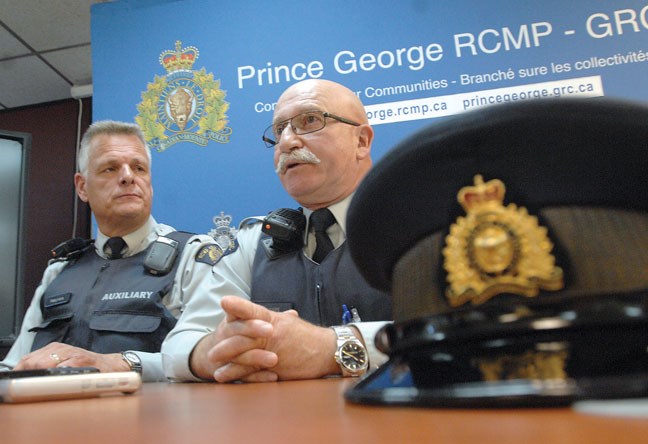Joe Naaykens has answered the volunteer call of duty for 19 years as an RCMP auxiliary constable and every time Canada Day rolls around he's reminded of why he likes serving the force.
He was in uniform seven years ago at the Canada Day celebrations at Fort George Park when he was approached by a family of new Canadians from Sierra Leone, a West African country still reeling from the violence of a 10-year civil war. The family asked Naaykens and his foot-patrol partner to pose with the family in front of a camera.
"The pictures were going back to their family in Sierra Leone, specifically to show their family that you can stand with the police and have your picture taken, and you didn't have to think too hard what that would be like to accomplish in Sierra Leone at that time," said Naaykens.
"At the end of the shift I went and told the co-ordinator exactly what had happened in those five minutes there and I had accomplished everything I needed to do that day on Canada Day."
Down to just 13 auxiliary constables, the RCMP has launched a recruitment drive to bring the auxiliary force up to at least 30. Training, on evenings and weekends, begins in the fall. That includes about 80 hours of classroom time studying Canadian and provincial law, traffic control, communications and operation of police equipment, self-defence techniques and community policing and crime prevention programs. That will be followed by another 40 hours of exams and drills. Applicants must be at least 19 years old, in good health and physically fit and must be able to pass a security clearance and a screening interview.
Auxiliary constables help the RCMP strengthen community ties and allow ordinary citizens to contribute to police activities, accompanying full-time members on ride-alongs, conducting downtown foot patrols, helping with crowd and traffic control, and operating speed watch equipment on city streets. They also make regular visits with children at schools during recesses or lunchtime to promote crime reduction strategies and show the kids that police duties don't always involve emergency situations or arresting criminals.
"I wanted to volunteer for something -- we all have to give back to the community -- and this is what I chose to do," said Naaykens. "It's an opportunity to present the police in a positive fashion and that's what I get the most satisfaction from."
Naaykens, 55, works full-time as a train engineer for VIA Rail and tries to work his shifts with his 56-year-old partner and friend, Giulio Massini. The two have known each other since grade school, when they attended Connaught school in Prince George.
"You have to want to be visible in the public and I enjoy the interaction with people and the positive interactions with students in school," said Massini. "I run into a lot of people at the farmers' market on Saturdays and it's mostly a positive experience for us and them."
Unlike police officers, auxiliary members cannot act on their own without direction from an officer and they are not allowed to operate police vehicles using emergency lights or sirens. They don't carry firearms, but they are equipped with a baton, handcuffs, pepper spray and a portable radio.
The force caters to the schedules of the volunteer constables, who must serve a minimum 160 hours per year. Naaykens averages about 200 hours per year and Massini puts in close to 400 hours every year.
Assignments are based on the desires of each auxiliary constable. Officers who don't enjoy making arrests are given day duties, while those who aren't adverse to slapping the cuffs on a perpetrator work nightshifts on weekends.
Massini is trained as an engineer and commercial pilot. Since he retired in 2004, he's been driving a school bus for Diversified Transportation. He wanted to become a full-time RCMP officer but at the time, in the mid-1970s, he did not meet the height restriction. Many younger recruits join the auxiliary force to enhance their chances of getting hired as full-time officers.
"We have needs during the whole week, so if a guy has a varied schedule, that works for us," said Ewen Freethy, co-ordinator of the Prince George RCMP auxiliary constable program. "Quite often these events are on a weekend or a stat holiday so their families have to be involved."
Interested applicants are asked to submit a request of interest through email at [email protected].
Naaykens said the timing of the recruitment drive, the first since 2005, is perfect, with Prince George getting ready to host the 2015 Canada Winter Games. The Games will bring thousands of visitors to the city for the two-week event.
"I was in Toronto last year [for the 2012 Ontario Summer Games] and I saw how many people were involved in that and I don't think Prince George recognizes how big it's going to be," said Naaykens. "If you're in Toronto and it looks big, well in Prince George it's going to be huge and we need as many auxiliaries as we can to commit the time to do the training and get acquainted with the program. There will be numerous opportunities when that event takes place."



